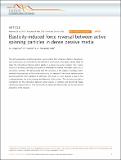Elasticity-induced force reversal between active spinning particles in dense passive media
Author(s)
Aragones Gomez, Juan Luis; Steimel, Joshua P.; Alexander-Katz, Alfredo
DownloadAragones-2016-Elasticity-induced.pdf (1.678Mb)
OPEN_ACCESS_POLICY
Open Access Policy
Creative Commons Attribution-Noncommercial-Share Alike
Terms of use
Metadata
Show full item recordAbstract
The self-organization of active particles is governed by their dynamic effective interactions. Such interactions are controlled by the medium in which such active agents reside. Here we study the interactions between active agents in a dense non-active medium. Our system consists of actuated, spinning, active particles embedded in a dense monolayer of passive, or non-active, particles. We demonstrate that the presence of the passive monolayer alters markedly the properties of the system and results in a reversal of the forces between active spinning particles from repulsive to attractive. The origin of such reversal is due to the coupling between the active stresses and elasticity of the system. This discovery provides a mechanism for the interaction between active agents in complex and structured media, opening up opportunities to tune the interaction range and directionality via the mechanical properties of the medium.
Date issued
2016-04Department
Massachusetts Institute of Technology. Department of Materials Science and EngineeringJournal
Nature Communications
Publisher
Nature Publishing Group
Citation
Aragones, J. L., J. P. Steimel, and A. Alexander-Katz. “Elasticity-Induced Force Reversal Between Active Spinning Particles in Dense Passive Media.” Nat Comms 7 (April 26, 2016): 11325.
Version: Final published version
ISSN
2041-1723